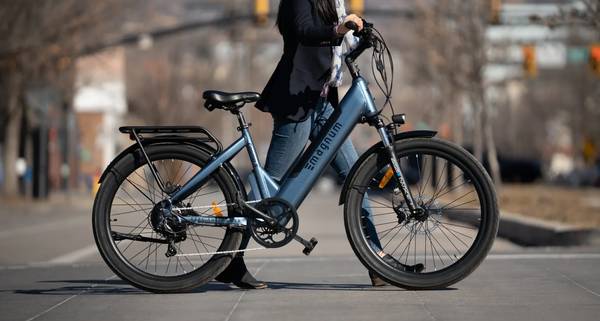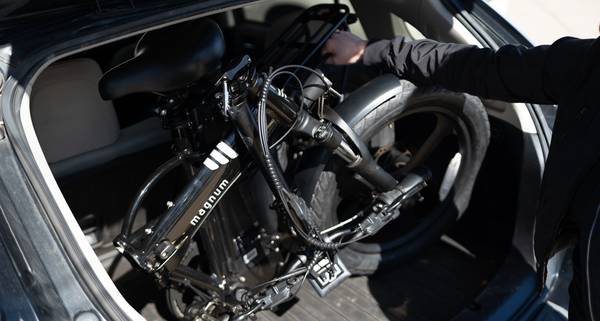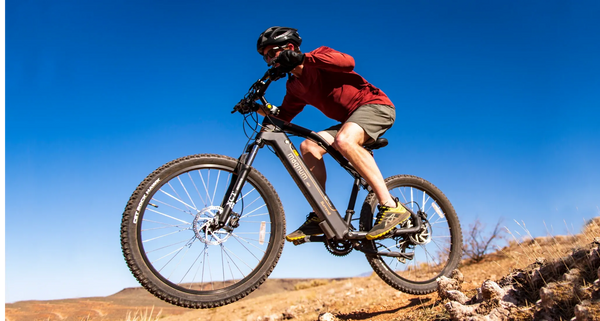How Much Do E-Bikes Weigh?
Every rider has a different set of preferences and must-have requirements for their ideal e-bike. Safety features, powerful motors, and long-lasting batteries are common, as are top-quality components and durable construction.
But what about the weight of an e-bike? We aren't just talking about total weight capacity or cargo load — we mean how much the e-bike weighs.
Let's take a look at the impact of e-bike weight on performance, power, portability, and more.
Jump ahead if you want!
Understanding E-Bike Weight
How E-Bike Weight Affects Performance
The Case For Heavier E-Bikes
Which E-Bike Weight Is Right For Me?
Understanding E-Bike Weight
E-bikes are commonly heavier than traditional non-motorized bikes for exactly the reason you'd think: the electrical components.
E-bike batteries can weigh 7-12 pounds, and motors weigh about the same, totaling 14-24 additional pounds for those components alone!
The cumulative weight of smaller components like the display, controller, and even motor cables add up, too.
So while a standard bicycle ranges from under 20 pounds (usually road bikes) to 40 pounds (heavier mountain bikes or beach cruisers), lightweight e-bikes start at roughly 40 pounds — and may reach up to 80 pounds!

The battery and electrical components make e-bikes a bit heavier than traditional bikes. Pictured: Magnum Cosmo X
How E-Bike Weight Affects Performance
Coupled with the weight of the rider and any cargo, an e-bike’s weight impacts the riding experience. Here are the main factors affected by e-bike weight.
Energy Efficiency
Put simply, a lighter bike requires less power in order to move. This is true for e-bikes as well as traditional bicycles — it’s why you see lightweight road bikes in races instead of heavy beach cruisers or robust mountain bikes.
On an e-bike, lighter weight means you can pedal with less effort, reducing reliance on your pedal-assist system (PAS); you’ll probably use your throttle less, too. Since the demand on your motor is lessened, your battery will have a better range.
Of course, cargo weight factors in here, too — a rider who weighs less or carries less cargo will also experience improvements in their e-bike's energy efficiency.
Handling and Maneuverability
When you’re weaving through tight alleyways or busy bike paths, maneuverability is key. You need to be flexible and agile to ride in these conditions without needing to stop.
Lighter e-bikes typically handle more responsively, meaning they turn corners more easily and have better natural balance. If you typically ride in more open spaces, this may not be an important factor for you. Still, it’s good to know what you’re dealing with when shopping for an e-bike.
Portability and Transportation
Do you live up a long flight of stairs with no elevator? Do you often take your e-bike when camping and need to load it onto a rack or remove a wheel for transport?
Think about the most common use cases for your e-bike. If you’re frequently in situations where you need to transport, lift, carry, disassemble, or otherwise move your e-bike outside of riding it, it’s important to know what e-bike weight you can reasonably handle.
Visiting your local dealer is a great way to see what different bike weights feel like! And luckily, there are plenty of easy-to-manage options, including lightweight e-bikes and folding e-bikes.

Folding e-bikes make transportation a breeze — no wheel removal required! Pictured: Magnum Premium 3 High-Step
The Case for Heavier E-Bikes
Looking at the performance implications, you might think it’s obvious that lighter is better when it comes to e-bikes. But for various reasons, a heavier e-bike can actually be the ideal choice for some.
Here are 3 ways that heavy e-bikes excel.
1. Suitability For Off-Roading and Challenging Terrain
If you regularly ride off-road or go mountain biking, you might know that heavier e-bikes typically offer better traction and stability on rough terrains or uneven paths.
Of course, other features like knobby tires and sturdy front suspension go a long way in helping with this, too! So overall, you’ll find that mountain e-bikes are typically heavier than commuter e-bikes.

Mountain bikes are often heavier than standard e-bikes, but they offer superior handling on rough terrain. Pictured: Magnum Summit 27.5”
2. Durability and Longevity
If you don’t mind a little additional weight, you’ll find a payoff in stronger, sturdier frames and components.
Sturdy construction results in increased durability, meaning fewer maintenance issues for the life of your e-bike — and potentially a longer-lasting lifespan for those components.
A few extra pounds in exchange for fewer repairs and more riding years? Sign us up!
3. Carrying Capacity
Whether you’re an e-bike delivery driver, a commuter with extra cargo or passengers in tow, or a long-haul e-bike traveler with camping gear … carrying capacity is important for many riders.
And while racks, baskets, trailers, and other accessories help to carry the cargo, a sturdily constructed e-bike will inevitably make your rides easier.
Psst — our cargo e-bikes are a great place to start!
Which E-Bike Weight Is Right For Me?
Many factors impact e-bike weight — and in turn, e-bike weight impacts many factors of your ride!
So when deciding on the right e-bike weight for you, decide what features are most important to you.
Lighter e-bikes typically offer…
- Better energy efficiency (though your electrical components play a big role here!)
- Better handling on normal terrain
- Easier portability
Heavier e-bikes typically offer…
- Better off-road handling
- Improved durability
- Increased carrying capacity
Now that you know the basics, want to know the best way to find out if an e-bike is the right weight for you?
Check it out in person. Pick it up, ride it around, and see how it feels! Stop by a Magnum dealer near you.
